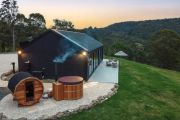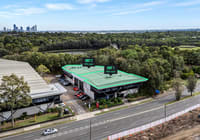
Plenary’s $1b Abu Dhabi deal boosts its housing firepower
Infrastructure developer Plenary, which has built a modest pipeline of 4800 homes in its 21-year history, is flush with cash and the firm worth about $1 billion will bid for housing projects equal to 70 per cent of that total this year alone.
Plenary has completed the sale of 49 per cent stake to Abu Dhabi sovereign wealth fund ADQ – first reported by The Australian Financial Review last year – and will use its much-boosted balance sheet to bid on four projects comprising 3400 homes, chairman Paul Oppenheim said.

“What it does give us is the breadth and capability to pursue more opportunities at the same time,” Mr Oppenheim told the Financial Review, in his first interview since completing the deal.
Plenary, with a core focus on infrastructure, can now expand further into housing as the development environment slowing improves, taking on rival financiers including Tetris Capital and Capella Capital in projects, such as an upcoming tender for a Homes Victoria project to develop 1000 homes on a North Melbourne site.
“What this does give is the ability to do that and also pursue the energy transmission projects coming up in NSW and Victoria,” Mr Oppenheim said.
Housing development – and financing needs – are picking up and Plenary wants to ride the rising tide. New housing approvals rose in last calendar year to 170,719, a two-year high, driven by detached house approvals that surged 7 per cent year on year to 109,607.
“While some signs of weakness in land sales and enquiry indicators suggest a sluggish start to 2025 for approvals, we still expect house commencements to grow seven per cent to 108,136 in FY2025,” said Maree Kilroy, Oxford Economics Australia’s lead economist for construction and property.
Doubts over target
But not all approvals lead to commencements – as dropout rates make clear – and to ensure the national cabinet target of 240,000 housing starts annually for five years, the national total would need to hit up to 260,000 approvals, the Housing Industry Association says.
The most the country has ever reached was 243,000 approvals in the 12-month period to August 2016 and over the five years to 2029, new forecasts from OEA show the highest number the country can expect to reach is 235,900, over the year to June 2029.
The commercial build-to-rent sector is also likely to remain subdued, with starts of new BTR homes likely to show little pick-up in the current financial year after dropping 19 per cent in FY24 to 5290, OEA said.
“A pickup is expected from FY2026 as financing costs ease, while policy uncertainty, which has held back some institutional investors, has faded,” Ms Kilroy said.
A cloud remains over privately funded developments which – like publicly funded and backed projects – face high borrowing and construction costs.
But public sector tenders have better prospects as state and federal governments push through plans to tackle the shortage of affordable rental accommodation.
Plenary’s capital injection from the ADQ deal gives it a balance sheet with several hundred million dollars more to put into projects than it had before the deal.
Plenary is bidding on tenders for 400 market and affordable homes for Homes Victoria and Development Victoria and for the 1000-home (both market and affordable dwelling) residential component of a mixed-use precinct in south-west Sydney.
It plans to bid on a Homes Victoria tender – likely to be the state’s third so-called ground lease deal, whereby the state government retains ownership of the land – for 1000 social, affordable and market units on the site of a public housing tower at 33 Alfred Street in North Melbourne.
The company will also be tendering for a package of 1000 social and affordable homes across 13 sites in and around Perth for DevelopmentWA.
Under the deal, original investor, Canada’s Caisse de depot et placement du Quebec (CDPQ) pension fund sold its 20 per cent stake to ADQ.
Plenary’s other shareholders, including Mr Oppenheim and cofounders John O’Rourke and Ray Wilson, also sold part of their holdings to ADQ and the company conducted a “significant” capital raise, Mr Oppenheim said.
Plenary, which already operates in Europe, the Middle East and North America, will expand its overseas operations with ADQ but countries in the northern hemisphere faced greater instability, Mr Oppenheim said.
“The politics and the priorities are shifting quickly,” he said. “Whereas infrastructure is generally a long-term game where governments, plan things out quite a way in advance – anyone can see your pipeline and the opportunities – it does feel in this part of world priorities can shift quite quickly.
“There is this backdrop of serious military conflict and talk of the need to increase defence spending and capability. That can only mean there’s potentially less money for other things.”











